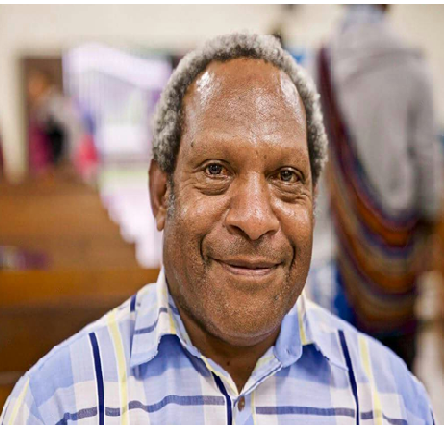“Mbo ik e etep koglomba medl nant?”, translates to “How will Medlpa die?” in Medlpa. This is a question Mr. Paraka Pena posted in his personal blog on Facebook, “Say It in Medlpa”.
Created in 2017 as an initiative by Paraka Manua Pena, a veteran educator by profession, the “Say it in Medlpa” blog came about in his attempt to get young people, especially those belonging to Mt. Hagen, Western Highlands Province interested in and even appreciate the language.
He recently uploaded; “Kontö rakpi nant keñ ruing?” asking when the season would begin, for those rugby fans. The replies are always in Medlpa, it seems as jokes are exchanged and comments are made. It holds a conversation being written out on social media in a tongue that is not the usual apart from Pidgin and English.
Belonging to Kumdi Tribe of the Mul Sub District of Mul Baiyer Lumusa District, Western Highlands Province, Medlpa is Pena’s and his wife’s, mother tongue, who also hails from Mt. Hagen.
A concern Mr. Pena aired on his blog was that there is a clear need for teaching of our mother tongues. This can be seen from the previous article published by this newsroom, “The Mother Language Dilemma” where there is a decline in the number of our youths knowing their local language.
Answering his own question, Pena expressed how Medlpa will die in two overruling risks, concepts on which apply to other mother languages in Papua New Guinea.
Firstly, it only takes one generation. It will only take one generation of the young people to overthrow the language, even entirely, by not knowing Medlpa. Languages in our culture had been passed down from generations mainly through parents teaching the young that when they grow up they would teach their young. This has come to a standstill when a generation fails to continue the process.
“Language is everything” Pena said, “culture, song, dance, speech, ceremony, meaning etc.”
“Without language, everything is only superficial” he passionately adds.
The second is parents not seeing the importance of continuing this process. This can take place in situations where parents hesitate or don’t put effort into ensuring their children learn their mother tongue. Like in scenarios where parents were raised in the city and go onto to raise their children in the city, or parents coming from a mixed parentage who could not commit to one culture. This of course can have unfortunate contributions but nevertheless, present the same risk.
“To us parents it seems, speaking good English and getting good grades in school is more important than speaking our mother tongue”, Mr. Pena stated.
He admits an issue he faces with the blog are usually to do with preferences of spelling, pronunciations and the meaning depicted other than that the “Say it in Medlpa” blog had shown progress in the last five years it seems, with 1.8K likes and 1.9K followers. Pena said he and his contributors are planning to venture into Tiktok and YouTube to further their reach of the young population.
“My aim is to get a whole generation of young people to be aware of the need to speak, and write in Medlpa”, Pena said.
He advises parents that in addition to ensuring their children speak good English, they must speak to their children in their mother tongue. If parents speak two different languages, they should agree as a couple to teach the children at least one.
There is assurance in the young generation catching on to their different mother tongues and taking pride in their unique cultures once presented with the opportunity to do so. Mr. Pena sees it as his duty to make known the dangers that lurk in the not too distant future if we as a society go on jeopardizing our mother languages.


